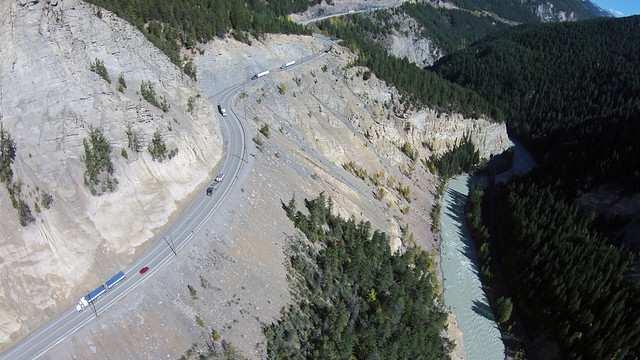
B.C. begins procurement process for final stage of costly Kicking Horse Canyon highway project
By David Kennedy
Construction RoadsThe final 4.8-kilometre segment of the Kicking Horse Canyon project is expected to cost a whopping $601 million

Part of the narrow two-lane segment of the Trans-Canada Highway that will be widened to four lanes during the final phase of work. PHOTO: B.C. Ministry of Transportation and Infrastructure/Flickr
GOLDEN, B.C.—It’s been more than 15 years since British Columbia began work on widening a scenic 26-kilometre stretch of the Trans-Canada Highway through a narrow pass in the Rocky Mountains. The Trans-Canada, or Hwy. 1, carries about 10,000 vehicles a day during the tourist-heavy summer months as it winds through Kicking Horse Canyon, just east of Golden, B.C.
Three previous stages of work have widened 21-kilometres of the route to four lanes, added two key bridges and set the stage for the final leg of the job. The province launched the procurement process for fourth stage of the Kicking Horse Canyon project last week, issuing a request for qualifications (RFQ) to teams interested in bidding on the work.
It won’t come cheap.
Despite covering just 4.8-kilometres, the province has budgeted $601 million for the project — with $215.2 million of that figure being provided by the federal government. This compares to $326 million for the three previous phases combined.
The latest cost estimate for phase 4 is also a whopping $151 million higher than budgeted in 2016. The province said much of the increase can be chalked up to changes to general project costs, such as materials. Meanwhile, implementing the province’s controversial Community Benefits Agreement will add $35 million to the budget.
The tough conditions and need to safeguard workers are responsible for the project’s significant price tag — amounting to more than $120 million per kilometre. The Ministry of Transportation and Infrastructure notes the final phase of the Kicking Horse Canyon job is the most technically challenging to complete, requiring significant excavation on the steep, unstable slopes. The relatively heavy traffic on the road and protection for the CP railway tracks running below are two other obstacles.
Contractors will have until mid-October to respond to the RFQ. The main aspects of the design-build contract include widening the road from two lanes to four, adding a median barrier and installing avalanche and rock fall protection.
The province plans to release a shortlist and issue a request for proposals for the work later this fall. Construction is scheduled to begin next summer.




